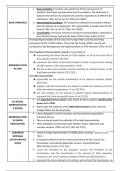SECURITY CASE STUDIES
National comparisons of energy
mix: the USA vs France
The USA
- Ranked 2nd in the world for energy consuming countries (but much
larger population than France)
- Over ¾ of energy comes from fossil fuels
- 10% renewables
- 8% nuclear energy
- However, can be considered more energy secure as only imports 15% of
its primary energy (not over reliant on other sources)
France
- 10th in terms of energy consuming countries worldwide
- Half of energy comes from fossil fuels
- 40% from nuclear energy (major player in nuclear power industry)
- In terms of energy security, France is around 50% dependent on imported supplies (all of
natural gas and oil is imported, as well as uranium for large nuclear power stations)
OPEC – Organisation of Petroleum Exporting
Countries
IGO enabling the co-operation of leading oil-producing countries, in order to collectively influence
the global market and maximise profits. It has 13 member countries which collectively own around
two thirds of the world’s oil reserves – but the majority of these are LICs.
Key members = Iran, Saudi Arabia, Venezuela, Iraq.
How does it operate?
Controls supply of oil to the world market
This therefore influences price
If OPEC wants more money, it will decrease its supply so that it is outweighed by demand
and consumers will pay more, which generates more profit. This slows down constant use of
oil, meaning reserves become depleted more slowly – sustainable?
Other roles – protects interest of member countries, limit price fluctuations, ensure efficient,
economic and regular supply of oil to consuming nations.
As more non OPEC countries develop, the OPEC has slightly less influence.
, Russian Gas to Europe
Russia is the world’s second largest producer of gas – and it supplies a quarter of Europe’s gas. 80%
of all gas transits through Ukraine, via 4 major pipelines.
The relationship between Russia and Ukraine
Ukraine sits between Russia and the EU, both geographically and metaphorically.
Russia has become concerned in recent years at the prospect of Ukraine joining the EU
and/or NATO. There are strained political relations between Russia and Western Europe, so
Russia would not be keen for Ukraine to formally join a European alliance.
Eastern Ukraine feels more connected to Russia, whilst the West of Ukraine is traditionally
more in support of national identity connected to Ukraine itself.
In 2014, Russia invaded the Crimea region of Ukraine and annexed it, declaring it part of
Russia – although this was not internationally recognised, and led to sanctions being applied
by both the EU and US.
How can geopolitical conflict between the nations affect energy security/energy pathways?
Ukraine is in a position to make life difficult for the Russian gas industry, potentially even by
stopping flows through the country.
2009 – pay disputes between Gazprom (Russian state owned gas company) and Naftogaz
(Ukrainian state owned gas company) led to Gazprom cutting off all supplies to Europe
travelling through Ukrainian pipelines.
2014 – Russia cut off Ukraine’s gas after complaining the country had failed to pay off debts
to Gazprom.
Russia has tried to bypass Ukraine for gas supplies e.g., via 2 northern pipelines, however the
2 countries are inextricably linked.
The EU would therefore be wise to not increase reliance on Russian gas due to the
significance of the geopolitical situation.
Canadian tar sands
Some of the world’s largest tar sands deposits are found in Canada, where the exploitation of
deposits on a commercial scale began in 1967 in the province of Alberta. Today, tar sands account for
40% of Canada’s oil output.
Pros –
- Provides Canada with a relatively secure source of energy, spurring massive economic
growth
- Produces large profits and provides thousands of jobs
Cons –
- Extraction methods in Alberta are among the most carbon intensive
- Destroying breeding grounds and reduction of biodiversity
- Industrialisation of vast areas of Indigenous territories, forests and wetlands
- Reserves are limited, so overdependence is becoming a prevalent issue



